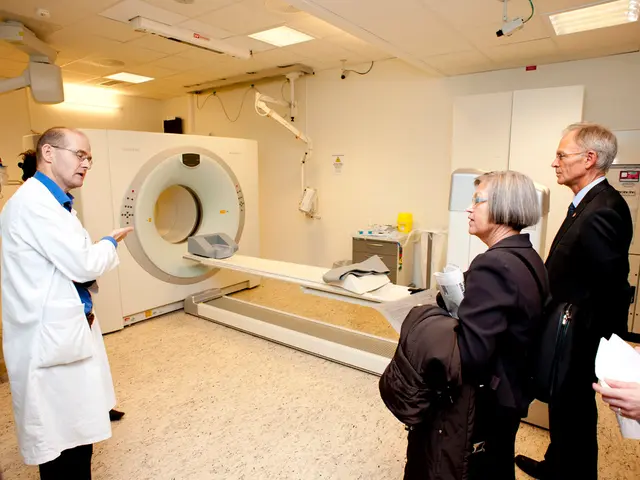Health Sector Obligations: Understanding Regulatory Compliance in Healthcare
Navigating the complex world of healthcare requires adherence to a maze of regulations. Healthcare is a multifaceted industry, encompassing insurance, pharmaceuticals, and medical devices, before even touching on patient care. Ensuring these elements work harmoniously is a colossal task that necessitates numerous regulations, safeguarding both patients and providers.
Compliance is the key to delivering quality care with trust, ensuring providers toe the line for the benefit of patients and clinical professionals alike. In essence, compliance means upholding expectations in care delivery and facing consequences if those expectations aren't met.
Let's delve into the main areas of healthcare compliance, focusing mainly on patient privacy, information regarding care, treatment, and prescribed medicines. Regulations ensure that care terms aren't dictated by outside pressures, like drug or insurance companies.
Patient Safety is the CornerstoneSafeguarding patients' wellbeing lies at the heart of compliance. A patient's needs come first, regardless of their specific health situation. Although emergency room care is legally mandated, the reality doesn't always reflect this ideal. Efforts are ongoing to establish a National Patient Safety Board, spurred by reports estimating 400,000 preventable deaths occurring while patients receive medical care. A recent study even found that one in four patients in the U.S. experiences harm during treatment that slows recovery or worsens conditions.
Strong Patient Privacy and Data SecurityBuilding trust is crucial in healthcare, and strong patient privacy and data security accomplish this objective. The Health Insurance Portability and Accountability Act (HIPAA) enforces safeguards aimed at protecting electronic protected health information (e-PHI). For instance, healthcare providers must provide patients with a Notice of Privacy Practices, outlining confidentiality, data security precautions, threat detection measures, prohibition of e-PHI misuse, and workforce compliance with regulations and privacy policy.
Billing and Coding Compliance are Non-negotiableFor all financial billing, coding documentation, claims, and medical records, providers must adhere to strict standards. This includes submitting complete and accurate claims, using the appropriate codes for supplies and services, and including necessary documents and records. Furthermore, all claims must comply with state and federal law, adhere to time limits, and be free from errors to ensure a smooth claims process.
Healthcare regulations protect patients and enhance the overall quality of care. Violating these regulations can lead to devastating consequences, such as loss of public trust, preventable deaths, and hefty fines for noncompliant entities. Embracing compliance is essential for providers, employers, and policy-makers committed to improving patient care and health outcomes.
- Compliance plays a crucial role in delivering high-quality, trustworthy care for both patients and clinical professionals.
- Civil rights are intertwined with healthcare rights, ensuring equal and fair access to medical services for all.
- Science and medical research contribute to advancements in chronic diseases, cancer, respiratory conditions, and other health issues.
- Workplace wellness programs address various medical conditions, promoting a healthy work environment for employees.
- Mental health, men's health, and women's health are essential aspects of overall health and wellness that require focused attention.
- Skin care, along with dermatological therapies and treatments, tackles issues related to skin health and conditions.
- Parenting involves understanding children's health needs, from newborn check-ups to managing common childhood illnesses.
- Cardiovascular health is vital in addressing heart disease, a leading cause of mortality worldwide.
- As industries evolve, so do regulations in manufacturing, aerospace, retail, and energy sectors, impacting the products and materials relevant to medical equipment and devices.
- Mental health, including neurological disorders, plays a significant role in shaping an individual's overall well-being.
- Environmental science enlightens us on pollution, climate change, and their effects on health, from air quality to the rise in seasonal allergies.
- Financing healthcare involves managing Medicare, venture capital, personal finance, and wealth management to cover rising costs.
- CBD products and their potential health benefits are being researched and evaluated in the medical community.
- Fitness and exercise, in addition to maintaining physical health, improve mental well-being and address various physiological conditions.
- Autoimmune disorders require ongoing management to mitigate their effects on patients, impacting various aspects of their lives.
- Smart home devices, wearables, and cybersecurity are shaping the future of healthcare technology and patient monitoring.
- Small businesses face unique challenges in navigating healthcare regulations, seeking competitive advantage and maintaining profitability.
- Investing wisely in the stock market, real estate, and private equity can generate funds for healthcare advancements and expansions.
- Saving and debt management are essential skills for individuals to prepare for future healthcare needs and unexpected expenses.
- Gadgets and smartphones play a crucial role in telemedicine, ensuring accessible healthcare for remote communities.
- New technologies like artificial intelligence and machine learning contribute to advancements in diagnostics, treatments, and workflow solutions.
- Diversity and inclusion in leadership and the workforce foster a more innovative and understanding environment in the healthcare industry.
- Entrepreneurship is fueling the development of new healthcare solutions, from medical innovations to fitness and wellness products.
- Transportation infrastructure and public accessibility are important factors in ensuring patients can easily access necessary healthcare services.
- Advocacy and awareness around therapies and treatments, especially for rare diseases, can lead to better funding and support for patients.
- Delivering care for patients with multiple medical conditions, such as digestive health and eye health, requires collaboration between various medical specialists.
- The rise in chronic illnesses and medical conditions necessitates continuous education and improvement in healthcare provider skills and knowledge.
- Healthcare continues to impact and be impacted by global trends, including advancements in technology, climate change, and social and economic changes.
- Navigating this intricate web of healthcare compliance is a collective responsibility, involving providers, employers, policymakers, and stakeholders, to assure successful, affordable, and equitable patient care.








